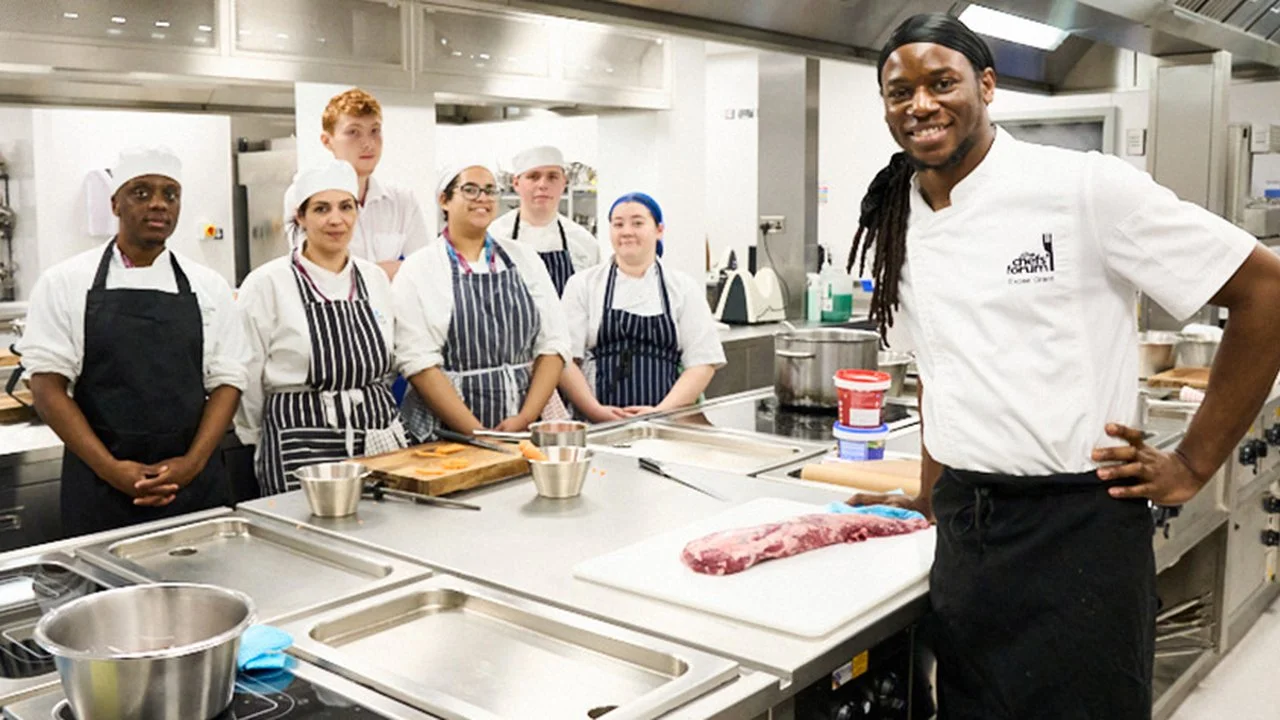Advertisements
Becoming a master chef is a dream pursued by many culinary enthusiasts. In Canada, renowned for its diverse culinary landscape and vibrant food culture, aspiring chefs have ample opportunities to hone their skills and embark on a rewarding culinary journey. This comprehensive guide explores the path to becoming a master chef in Canada, from culinary education and training to career advancement opportunities and industry insights.
The Culinary Landscape of Canada
The culinary landscape of Canada is a vibrant tapestry woven with diverse flavors, cultural influences, and regional specialties. As the second-largest country in the world, spanning from the Atlantic to the Pacific and the Arctic Ocean to the United States border, Canada boasts a rich and varied culinary heritage shaped by its indigenous roots, immigrant communities, and geographical diversity.
Indigenous Cuisine: At the heart of Canada’s culinary heritage lies indigenous cuisine, which reflects the traditions, ingredients, and cooking methods of the First Nations, Métis, and Inuit peoples. Staples such as bannock (a type of bread), pemmican (a mixture of dried meat, fat, and berries), and wild game like bison, moose, and caribou are integral to indigenous culinary traditions. Indigenous ingredients such as wild berries, root vegetables, and freshwater fish continue to inspire modern Canadian chefs seeking to honor and celebrate indigenous culture and cuisine.
French Influence: Canada’s culinary landscape bears the indelible imprint of French cuisine, dating back to the early exploration and colonization of Canada by French settlers. French-inspired dishes such as poutine (French fries topped with cheese curds and gravy), tourtière (meat pie), and cretons (pork spread) are beloved across the country, particularly in Quebec, where French influence is most pronounced. Montreal, in particular, is renowned for its vibrant food scene, with iconic dishes like bagels, smoked meat, and pâté chinois (a variation of shepherd’s pie) reflecting the city’s French heritage.
British Influence: The British influence on Canadian cuisine is evident in dishes such as fish and chips, Yorkshire pudding, and beef Wellington, which have become part of Canada’s culinary fabric. Tea culture, with its afternoon tea rituals and scones with clotted cream and jam, also reflects British culinary traditions, especially in regions with strong ties to British colonial history, such as the Maritimes and British Columbia.
Immigrant Contributions: Canada’s culinary landscape is enriched by the contributions of immigrant communities from around the world, who have brought their culinary traditions, flavors, and ingredients to Canadian shores. Italian, Chinese, Greek, Indian, and Vietnamese cuisines, among others, have become integral parts of Canada’s culinary mosaic, influencing everything from street food and fast-casual dining to fine dining establishments.
Regional Specialties: Canada’s vast geographical diversity gives rise to a multitude of regional specialties, each showcasing the unique ingredients and culinary traditions of its respective region. From Atlantic Canada’s seafood-rich cuisine, including lobster, scallops, and Atlantic salmon, to the prairies’ hearty fare of bison, elk, and Saskatoon berries, and the West Coast’s bounty of fresh seafood, organic produce, and indigenous ingredients, each region offers a distinct culinary experience.
Modern Canadian Cuisine: In recent years, Canadian cuisine has undergone a renaissance, with chefs across the country embracing local, seasonal ingredients and innovative cooking techniques to create modern interpretations of classic dishes and inventive new creations. Farm-to-table dining, nose-to-tail cooking, and foraging for wild ingredients have become hallmarks of contemporary Canadian cuisine, reflecting a commitment to sustainability, authenticity, and creativity.
In conclusion, the culinary landscape of Canada is a rich tapestry woven with diverse flavors, cultural influences, and regional specialties. From indigenous traditions and French-inspired cuisine to immigrant contributions and modern innovations, Canada’s culinary heritage reflects the country’s multicultural fabric and its deep connection to the land, the sea, and the communities that call it home.
Introduction to the Canadian culinary industry, including restaurants, hotels, catering services, and culinary schools:
Restaurants: Canada boasts a thriving restaurant scene, with a diverse array of dining establishments ranging from casual eateries and family-owned bistros to upscale fine dining restaurants. Major cities like Toronto, Vancouver, and Montreal are renowned for their eclectic culinary offerings, featuring cuisines from around the world, innovative chef-driven concepts, and farm-to-table dining experiences. Whether it’s exploring the bustling food markets of Toronto’s Kensington Market, savoring Quebecois classics in Montreal’s historic Old Port, or indulging in farm-fresh cuisine in the Okanagan Valley, Canada’s restaurant scene offers something to satisfy every palate and culinary preference.
Hotels: The hospitality industry plays a crucial role in Canada’s culinary landscape, with hotels and resorts offering a variety of dining options to guests. From luxurious five-star hotels with award-winning restaurants to cozy bed-and-breakfasts serving hearty home-cooked meals, Canadian hotels cater to a diverse clientele seeking comfort, convenience, and culinary excellence. Many hotels collaborate with local farmers, artisans, and producers to showcase regional ingredients and flavors, providing guests with an authentic taste of Canadian cuisine.
Catering Services: Catering services are in high demand across Canada, catering to a wide range of events and occasions, including weddings, corporate functions, and private parties. Caterers work closely with clients to create customized menus tailored to their preferences and dietary requirements, offering everything from elegant plated dinners and gourmet buffets to casual cocktail receptions and themed food stations. With a focus on quality, creativity, and impeccable service, Canadian catering companies strive to exceed expectations and create memorable dining experiences for their clients.
Culinary Schools: Canada is home to several prestigious culinary schools and institutes that provide aspiring chefs and culinary professionals with world-class training and education. From intensive diploma programs and apprenticeships to certificate courses and workshops, culinary schools offer a comprehensive curriculum that covers everything from fundamental cooking techniques and culinary theory to menu planning, kitchen management, and entrepreneurship. Many culinary schools have state-of-the-art facilities, experienced chef instructors, and industry partnerships that provide students with hands-on training, real-world experience, and opportunities for professional networking and career advancement.
In conclusion, the Canadian culinary industry is a vibrant and multifaceted sector that encompasses restaurants, hotels, catering services, and culinary schools. With its diverse culinary offerings, innovative culinary talents, and commitment to excellence, Canada’s culinary landscape continues to thrive and evolve, offering endless opportunities for culinary professionals to learn, grow, and succeed in this exciting field.
Advertisements
Pursuing Culinary Education
Pursuing Culinary Education in Canada
Culinary education plays a pivotal role in shaping aspiring chefs and culinary professionals into skilled and knowledgeable practitioners of the culinary arts. In Canada, renowned for its diverse culinary landscape and vibrant food culture, culinary education programs offer aspiring chefs a pathway to success in the dynamic and competitive culinary industry. Whether aspiring to become a chef in a Michelin-starred restaurant, a pastry chef in a boutique bakery, or a culinary entrepreneur launching their own food business, pursuing culinary education in Canada provides the essential skills, knowledge, and experience needed to thrive in the culinary profession.
Importance of Culinary Education: Culinary education provides aspiring chefs with a solid foundation in culinary theory, practical skills, and industry knowledge essential for success in the culinary industry. From mastering fundamental cooking techniques and food safety protocols to learning about menu planning, flavor profiling, and kitchen management, culinary education equips students with the tools and expertise needed to excel in professional kitchens and culinary environments. Additionally, culinary education fosters creativity, innovation, and a passion for food, inspiring students to explore new flavors, techniques, and culinary trends.
Types of Culinary Education Programs: In Canada, culinary education programs are offered by a variety of institutions, including culinary schools, colleges, universities, and apprenticeship programs. These programs range from intensive diploma and certificate programs to degree programs and apprenticeship training, catering to students with diverse educational backgrounds, career goals, and levels of experience. Whether pursuing a traditional culinary education program or a specialized course in pastry arts, culinary nutrition, or international cuisines, students have access to a wide range of educational options tailored to their interests and aspirations.
Choosing the Right Culinary Program: When choosing a culinary education program, aspiring chefs should consider several factors, including the program’s curriculum, faculty expertise, facilities, accreditation, and industry connections. It’s essential to research and compare different programs to find the one that best aligns with one’s career goals, learning style, and personal preferences. Visiting campuses, attending open houses, and speaking with current students and alumni can provide valuable insights into the quality of the program and the overall student experience.
Curriculum and Course Content: Culinary education programs typically cover a broad range of topics related to culinary arts, including knife skills, food preparation, cooking methods, baking and pastry techniques, menu development, food styling, and presentation. Students also learn about culinary theory, food science, nutrition, sanitation, and food safety practices essential for working in professional kitchens. Hands-on training in well-equipped kitchen facilities, as well as opportunities for internships, externships, and industry placements, allow students to gain practical experience and apply their skills in real-world culinary settings.
Career Opportunities and Advancement: Upon completing a culinary education program, graduates are prepared to pursue a variety of career opportunities in the culinary industry, including positions as line cooks, sous chefs, pastry chefs, executive chefs, catering managers, and food entrepreneurs. With experience, expertise, and a strong professional network, culinary professionals can advance to higher-level positions, open their own restaurants or catering businesses, or transition into roles in culinary management, food media, consulting, or culinary education.
In conclusion, pursuing culinary education in Canada offers aspiring chefs and culinary professionals the opportunity to acquire the essential skills, knowledge, and experience needed to succeed in the dynamic and competitive culinary industry. Whether attending a culinary school, college, university, or apprenticeship program, students have access to comprehensive educational programs, experienced instructors, and state-of-the-art facilities that prepare them for rewarding careers in the culinary arts. By investing in culinary education, aspiring chefs can embark on a fulfilling culinary journey, realizing their passion for food and achieving their culinary dreams in Canada’s vibrant and diverse culinary landscape.
Developing Culinary Skills (A Guide for Aspiring Chefs)
Culinary skills are the foundation of success for any aspiring chef. Whether you dream of running a Michelin-starred restaurant, owning a bustling bistro, or becoming a renowned pastry chef, mastering fundamental culinary techniques and honing your skills is essential to excel in the dynamic and competitive culinary industry. In this guide, we’ll explore practical strategies and tips for developing culinary skills and becoming a proficient and confident practitioner of the culinary arts.
Mastering Fundamental Techniques:
- Begin by mastering fundamental culinary techniques, such as knife skills, food preparation, cooking methods (e.g., sautéing, roasting, braising), and baking and pastry techniques.
- Practice precision and consistency in your culinary tasks, paying attention to details such as ingredient measurements, cooking temperatures, and cooking times.
- Experiment with different ingredients, flavors, and cuisines to expand your culinary repertoire and develop your palate.
Hands-On Training and Practice:
- Gain hands-on experience through practical training in professional kitchen settings, such as culinary schools, restaurants, hotels, and catering establishments.
- Seek opportunities for internships, externships, apprenticeships, and culinary work placements to learn from experienced chefs and gain real-world experience.
- Practice your culinary skills regularly at home or in a professional kitchen environment, experimenting with new recipes, techniques, and ingredients.
Learn from Experienced Chefs and Mentors:
- Seek guidance and mentorship from experienced chefs and culinary professionals who can share their knowledge, expertise, and insights into the culinary industry.
- Shadow chefs in professional kitchens, assist with food preparation and cooking tasks, and ask questions to learn from their experience and expertise.
- Take advantage of mentorship programs, culinary workshops, and cooking classes offered by culinary schools, community organizations, and industry associations.
Continuous Learning and Skill Development:
- Embrace a mindset of continuous learning and skill development, recognizing that culinary mastery is a lifelong journey.
- Stay updated on culinary trends, techniques, and innovations through culinary publications, cookbooks, online resources, and industry events.
- Attend culinary workshops, seminars, and cooking demonstrations to learn new skills, techniques, and culinary trends from industry experts and renowned chefs.
Creativity and Innovation:
- Cultivate your creativity and innovation in the kitchen by experimenting with new ingredients, flavor combinations, and culinary techniques.
- Encourage creativity in your culinary endeavors by exploring different cuisines, cultural traditions, and culinary trends from around the world.
- Develop your own signature dishes and culinary style that reflect your personality, culinary influences, and unique culinary perspective.
Practice Patience and Persistence:
Advertisements
- Recognize that developing culinary skills takes time, patience, and persistence. Be prepared to make mistakes, learn from them, and keep improving.
- Stay committed to your culinary journey, setting realistic goals, and celebrating your progress along the way.
- Embrace challenges and setbacks as opportunities for growth and learning, and never lose sight of your passion for food and cooking.
In conclusion, developing culinary skills is a rewarding and fulfilling journey that requires dedication, practice, and a love for food. By mastering fundamental techniques, gaining hands-on experience, learning from experienced chefs, and embracing continuous learning and creativity, aspiring chefs can cultivate the skills and expertise needed to succeed in the dynamic and ever-evolving culinary industry. So roll up your sleeves, sharpen your knives, and embark on your culinary journey with passion, perseverance, and a commitment to culinary excellence.
Gaining Practical Experience
Practical experience is invaluable for aspiring chefs looking to hone their skills, build confidence, and prepare for a successful career in the culinary industry. While culinary education provides a solid foundation, real-world experience in professional kitchen environments is essential for mastering culinary techniques, developing problem-solving skills, and understanding the nuances of working in a fast-paced culinary setting. In this guide, we’ll explore practical strategies and tips for gaining practical experience in the culinary industry and maximizing your learning opportunities.
Seek Entry-Level Positions:
- Start by seeking entry-level positions in restaurants, hotels, catering companies, or food service establishments.
- Look for positions such as line cook, prep cook, kitchen assistant, or dishwasher, which provide hands-on experience in a professional kitchen environment.
- Be willing to start at the bottom and work your way up, as entry-level positions offer valuable opportunities to learn from experienced chefs, gain practical skills, and prove your dedication and work ethic.
Apply for Internships or Externships:
- Consider applying for culinary internships or externships, which provide structured training programs and hands-on experience in professional kitchens.
- Research restaurants, hotels, and culinary establishments that offer internship programs and submit applications well in advance, as positions may be competitive.
- Internships and externships allow you to work alongside experienced chefs, learn from their expertise, and gain exposure to different culinary techniques, cuisines, and kitchen operations.
Volunteer for Catering Events or Pop-Up Dinners:
- Volunteer to assist with catering events, pop-up dinners, or food festivals in your community to gain practical experience outside of traditional restaurant settings.
- Volunteer opportunities allow you to work on a variety of culinary tasks, such as food preparation, plating, and service, and provide exposure to different culinary styles and cuisines.
- Networking with industry professionals at catering events or pop-up dinners can also lead to future employment opportunities and valuable connections in the culinary industry.
Participate in Culinary Competitions or Challenges:
- Participate in culinary competitions, challenges, or cook-offs to showcase your skills, creativity, and culinary talent.
- Competing in culinary events provides practical experience working under pressure, meeting deadlines, and executing dishes to high standards.
- Even if you don’t win, participating in culinary competitions can be a valuable learning experience and an opportunity to receive feedback from judges and industry professionals.
Work with Local Farmers or Food Producers:
- Seek opportunities to work with local farmers, food producers, or artisanal food businesses to gain firsthand experience with fresh, seasonal ingredients.
- Farm-to-table experiences allow you to learn about ingredient sourcing, sustainability practices, and the importance of quality ingredients in culinary creations.
- Building relationships with local farmers and food producers can also lead to collaboration opportunities and unique culinary experiences.
Document Your Experiences and Learning:
- Keep a journal or logbook to document your practical experiences, including the skills you’ve learned, the challenges you’ve overcome, and the successes you’ve achieved.
- Reflect on your experiences regularly, identifying areas for improvement and setting goals for continued growth and development.
- Use your documented experiences to update your resume, portfolio, or culinary school applications, showcasing your practical skills and industry experience to potential employers or culinary educators.
In conclusion, gaining practical experience in the culinary industry is essential for aspiring chefs to develop their skills, build confidence, and prepare for successful careers in the dynamic and competitive culinary field. By seeking entry-level positions, applying for internships or externships, volunteering for catering events, participating in culinary competitions, working with local farmers or food producers, and documenting your experiences and learning, you can maximize your opportunities for practical learning and accelerate your progress towards culinary mastery. So roll up your sleeves, embrace every opportunity to learn and grow, and immerse yourself fully in the exciting world of culinary arts.
Specializing and Niche Culinary Fields
While traditional culinary education often covers a broad range of culinary techniques and cuisines, many aspiring chefs find themselves drawn to specialized or niche culinary fields that allow them to explore their passions, showcase their creativity, and carve out unique career pathways in the culinary industry. From pastry arts and chocolate confectionery to plant-based cuisine and food styling, specializing in a niche culinary field offers opportunities for culinary professionals to distinguish themselves, cater to specific dietary preferences or interests, and make a meaningful impact in their chosen area of expertise. In this guide, we’ll explore some of the specialized and niche culinary fields, along with practical tips for aspiring chefs interested in pursuing careers in these exciting areas.
- Pastry Arts and Baking:
- Pastry arts and baking focus on the creation of delicious and visually stunning desserts, pastries, and baked goods.
- Aspiring pastry chefs can specialize in areas such as cake decorating, bread making, artisanal pastries, or chocolate confectionery.
- Practical experience, attention to detail, and creativity are essential for success in pastry arts, along with a strong understanding of baking techniques, flavor combinations, and presentation skills.
- Pursuing specialized training or apprenticeships in pastry arts and baking can provide aspiring chefs with the skills and expertise needed to excel in this competitive field.
- Plant-Based Cuisine:
- With the growing popularity of plant-based diets and sustainability concerns, plant-based cuisine has emerged as a niche culinary field offering innovative and delicious alternatives to traditional meat and dairy-based dishes.
- Chefs specializing in plant-based cuisine focus on creating flavorful and nutritious dishes using a variety of plant-based ingredients, such as vegetables, fruits, grains, legumes, and plant-based proteins.
- Knowledge of plant-based cooking techniques, ingredient sourcing, and flavor profiling is essential for chefs interested in pursuing careers in plant-based cuisine.
- Taking courses or workshops in plant-based cooking, experimenting with plant-based recipes, and staying updated on culinary trends can help aspiring chefs develop their skills and expertise in this growing culinary field.
- Food Styling and Photography:
- Food styling and photography involve the art of arranging and presenting food in visually appealing ways for photography, advertising, cookbooks, and social media.
- Food stylists work closely with photographers, chefs, and clients to create captivating food images that evoke a desired mood or aesthetic.
- Skills such as composition, lighting, color theory, and prop styling are essential for food stylists, along with a keen eye for detail and creativity.
- Aspiring food stylists can gain practical experience by assisting experienced professionals, practicing food styling techniques at home, and building a portfolio showcasing their work.
- Culinary Nutrition:
- Culinary nutrition combines culinary arts with nutrition science to create delicious and nutritious meals that support health and wellness goals.
- Culinary nutritionists focus on developing recipes, meal plans, and cooking techniques that promote optimal health, address dietary restrictions, and cater to specific nutritional needs.
- Knowledge of nutrition principles, dietary guidelines, and ingredient substitutions is essential for culinary nutritionists, along with culinary skills and a passion for healthy cooking.
- Pursuing certification or coursework in culinary nutrition, attending workshops or seminars on nutrition science, and staying informed about current research and trends in nutrition can help aspiring culinary nutritionists build their expertise in this specialized field.
- Artisanal Food Production:
- Artisanal food production involves the creation of handcrafted, small-batch food products using traditional techniques and high-quality ingredients.
- Artisans specialize in crafting a variety of gourmet food products, such as cheeses, charcuterie, preserves, sauces, condiments, and specialty baked goods.
- Skills such as food preservation, fermentation, curing, and aging are essential for artisans, along with a deep understanding of ingredient sourcing, flavor development, and food safety regulations.
- Aspiring artisans can gain practical experience by apprenticing with experienced producers, attending workshops or courses on artisanal food production, and experimenting with recipes and techniques at home.
Practical Tips for Aspiring Chefs Interested in Specializing in Niche Culinary Fields:
- Explore Your Passion: Identify your interests, passions, and strengths within the culinary arts, and consider how you can specialize or niche down to focus on specific areas that resonate with you.
- Gain Practical Experience: Seek opportunities for hands-on training, internships, apprenticeships, or workshops in your chosen niche culinary field to develop your skills, build your portfolio, and network with industry professionals.
- Learn from Experts: Connect with experienced chefs, artisans, or professionals working in your desired niche culinary field, and seek their guidance, mentorship, and advice on how to succeed in the industry.
- Stay Informed and Inspired: Stay updated on culinary trends, innovations, and developments in your niche culinary field by reading books, attending events, following industry publications, and engaging with online communities and social media platforms.
- Build Your Brand: Develop your personal brand as a specialist or expert in your chosen niche culinary field by showcasing your work, sharing your knowledge and expertise, and creating a professional portfolio or online presence to attract clients, collaborators, or job opportunities.
- Be Open to Learning and Growth: Embrace opportunities for continuous learning, experimentation, and growth in your niche culinary field, and be open to feedback, challenges, and new experiences that will help you evolve and excel as a culinary professional.
In conclusion, specializing in a niche culinary field offers aspiring chefs the opportunity to focus their skills, creativity, and passion on specific areas of interest within the culinary arts, allowing them to distinguish themselves, cater to specific audiences or dietary preferences, and make a meaningful impact in their chosen area of expertise. Whether you’re drawn to pastry arts, plant-based cuisine, food styling, culinary nutrition, artisanal food production, or another niche culinary field, pursuing specialized training, gaining practical experience, and staying informed and inspired are key to achieving success and fulfillment in your culinary career. So follow your passion, embrace your uniqueness, and embark on your journey to becoming a specialist in the exciting and diverse world of niche culinary fields.
Career Advancement Opportunities in the Culinary Industry
The culinary industry offers a multitude of career advancement opportunities for passionate and ambitious professionals looking to grow, excel, and make their mark in the dynamic and competitive world of food and hospitality. Whether you’re a chef, pastry chef, food stylist, culinary educator, or entrepreneur, there are numerous pathways for career advancement and professional development in the culinary field. In this guide, we’ll explore some of the key avenues for career advancement in the culinary industry and provide practical tips for achieving success and fulfillment in your culinary career.
Sous Chef to Executive Chef:
-
- Many chefs begin their careers as line cooks or commis chefs and work their way up to higher positions, such as sous chef and executive chef.
- Advancing to roles like sous chef or executive chef requires honing culinary skills, leadership abilities, and kitchen management expertise.
- Sous chefs assist the executive chef in overseeing kitchen operations, menu development, and staff training, while executive chefs are responsible for overall kitchen management, culinary creativity, and menu execution.
Specialization and Expertise:
-
- Specializing in a niche culinary field or area of expertise can open up unique career advancement opportunities.
- Whether it’s pastry arts, plant-based cuisine, culinary nutrition, food styling, or artisanal food production, becoming an expert in a specialized area can lead to opportunities for consulting, teaching, writing, or entrepreneurship.
Culinary Education and Training:
Advertisements
-
- Pursuing further education and training in the culinary arts can provide opportunities for career advancement and professional growth.
- Obtaining certifications, diplomas, or degrees in culinary arts, hospitality management, or specialized culinary fields can enhance your skills, knowledge, and credentials, opening up doors to higher-level positions, teaching opportunities, or leadership roles in the industry.
Management and Leadership:
-
- Transitioning into management or leadership roles within the culinary industry can offer opportunities for career advancement and increased responsibility.
- Positions such as kitchen manager, restaurant manager, catering director, or food and beverage director involve overseeing operations, managing staff, and ensuring quality and consistency in food service.
Entrepreneurship and Business Ownership:
-
- Many culinary professionals aspire to start their own businesses, whether it’s opening a restaurant, bakery, catering company, food truck, or artisanal food product business.
- Entrepreneurship offers opportunities for creative freedom, autonomy, and financial success, but also requires strategic planning, business acumen, and a strong understanding of the culinary market and industry trends.
Consulting and Freelancing:
-
- Experienced culinary professionals can leverage their expertise and industry knowledge to pursue consulting or freelancing opportunities.
- Consulting roles may involve advising restaurants, food companies, or hospitality businesses on menu development, kitchen design, operations management, or culinary training.
- Freelancing opportunities may include food styling, recipe development, culinary writing, teaching cooking classes, or hosting culinary events and workshops.
Practical Tips for Career Advancement in the Culinary Industry:
- Set Clear Goals: Define your career goals and aspirations, and create a roadmap for achieving them through education, training, and professional development.
- Seek Mentorship and Guidance: Connect with experienced chefs, industry professionals, or mentors who can provide guidance, advice, and support on your career journey.
- Continuously Improve and Learn: Stay updated on culinary trends, techniques, and innovations by attending workshops, seminars, and industry events, and be open to continuous learning and skill development.
- Network and Build Relationships: Cultivate professional relationships and networks within the culinary industry, both online and offline, and seize opportunities for collaboration, mentorship, and career advancement.
- Showcase Your Skills and Expertise: Build a strong professional brand by showcasing your culinary skills, expertise, and achievements through a professional portfolio, website, social media presence, or industry publications.
- Stay Flexible and Adapt: Embrace change, innovation, and new opportunities in the culinary industry, and be willing to adapt to evolving trends, technologies, and consumer preferences.
In conclusion, the culinary industry offers a wealth of career advancement opportunities for passionate and dedicated professionals willing to invest in their skills, knowledge, and growth. Whether you aspire to become an executive chef, specialize in a niche culinary field, start your own business, or pursue consulting or teaching opportunities, there are numerous pathways to success and fulfillment in the dynamic and ever-evolving world of food and hospitality. By setting clear goals, seeking mentorship, continuously improving, building relationships, showcasing your expertise, and staying flexible and adaptable, you can achieve your career aspirations and make a meaningful impact in the culinary industry. So seize the opportunities before you, embrace your passion for food, and embark on your journey to career advancement and success in the exciting and rewarding world of culinary arts.
Challenges and Opportunities in the Culinary Industry
The culinary industry is a vibrant and dynamic field that offers both challenges and opportunities for professionals seeking to make their mark in the world of food and hospitality. From evolving consumer tastes and technological advancements to labor shortages and sustainability concerns, the culinary industry presents a complex and ever-changing landscape that requires adaptability, innovation, and resilience. In this guide, we’ll explore some of the key challenges and opportunities facing the culinary industry and provide insights into how professionals can navigate and thrive in this dynamic environment.
Challenges:
Labor Shortages:
-
- One of the most pressing challenges facing the culinary industry is the shortage of skilled labor, including chefs, cooks, and kitchen staff.
- Factors contributing to labor shortages include long hours, low wages, high turnover rates, and a lack of qualified candidates entering the industry.
- Labor shortages can lead to increased stress, burnout, and operational challenges for restaurants, hotels, and food service establishments.
Changing Consumer Preferences:
-
- The culinary landscape is constantly evolving as consumer preferences and dietary trends shift over time.
- Rising demand for healthier, more sustainable, and ethically sourced food options has led to increased interest in plant-based cuisine, locally sourced ingredients, and artisanal food products.
- Keeping up with changing consumer preferences and adapting menus and offerings accordingly can be a challenge for chefs and food businesses.
Economic Pressures:
-
- Economic factors such as inflation, rising food costs, and fluctuating consumer spending can impact the profitability and sustainability of food businesses.
- Restaurants and food service establishments must navigate tight profit margins, fierce competition, and operational costs while maintaining quality and service standards.
Sustainability and Environmental Concerns:
-
- With growing awareness of environmental issues and climate change, there is increasing pressure on the culinary industry to adopt sustainable practices and reduce its environmental footprint.
- Challenges include sourcing sustainable ingredients, minimizing food waste, reducing energy consumption, and implementing eco-friendly packaging and disposal methods.
Technological Disruption:
-
- Rapid advancements in technology are reshaping the culinary industry, from automated kitchen equipment and digital ordering systems to food delivery apps and online reservations platforms.
- While technology offers opportunities for efficiency and innovation, it also presents challenges such as the need for staff training, cybersecurity risks, and maintaining a human touch in hospitality.
Opportunities:
Culinary Innovation:
-
- The culinary industry thrives on creativity and innovation, offering opportunities for chefs and food entrepreneurs to experiment with new flavors, ingredients, and techniques.
- Embracing culinary innovation can differentiate businesses, attract customers, and drive growth in an increasingly competitive market.
Diversity and Inclusion:
-
- There is growing recognition of the importance of diversity and inclusion in the culinary industry, with opportunities to celebrate diverse culinary traditions, cultures, and voices.
- Embracing diversity and inclusivity can foster creativity, collaboration, and cultural exchange, enriching the culinary landscape and creating more inclusive and welcoming spaces for both professionals and customers.
Education and Training:
-
- Investing in education and training is essential for addressing labor shortages and building a skilled workforce for the future.
- Culinary schools, apprenticeship programs, and vocational training initiatives provide opportunities for aspiring chefs and kitchen staff to gain the skills and experience needed to succeed in the industry.
Entrepreneurship and Small Business Ownership:
-
- Despite the challenges, there are opportunities for aspiring entrepreneurs to start their own culinary businesses, whether it’s opening a restaurant, food truck, catering company, or artisanal food product business.
- Entrepreneurship offers opportunities for creative freedom, innovation, and financial success, allowing individuals to showcase their culinary talents and build their own culinary brands.
Community Engagement and Social Responsibility:
Advertisements
-
- Many chefs and food businesses are embracing community engagement and social responsibility initiatives as a way to give back and make a positive impact.
- Opportunities include partnering with local farmers and producers, supporting food rescue and hunger relief programs, and advocating for sustainable and ethical food practices.
In conclusion, the culinary industry presents both challenges and opportunities for professionals seeking to build careers and businesses in the world of food and hospitality. By staying informed, adaptable, and innovative, professionals can navigate the challenges of labor shortages, changing consumer preferences, economic pressures, sustainability concerns, and technological disruption, while leveraging opportunities for culinary innovation, diversity and inclusion, education and training, entrepreneurship, and community engagement. With passion, resilience, and a commitment to excellence, individuals can thrive and succeed in the dynamic and rewarding landscape of the culinary industry.
Culinary Excellence and Recognition
Culinary excellence is a hallmark of the culinary industry, showcasing the artistry, skill, and dedication of chefs who strive for perfection in their craft. From innovative flavor combinations and stunning presentation to meticulous attention to detail and unwavering commitment to quality, culinary excellence embodies the pursuit of gastronomic perfection and the relentless quest for culinary innovation. In this guide, we’ll explore the concept of culinary excellence, the various forms of recognition available to chefs, and the importance of celebrating and honoring the achievements of culinary professionals.
What is Culinary Excellence?
Culinary excellence encompasses a broad spectrum of qualities and attributes that distinguish exceptional chefs and culinary professionals. It goes beyond technical proficiency and encompasses creativity, innovation, passion, and a deep understanding of ingredients, flavors, and techniques. Culinary excellence is characterized by:
- Creativity and Innovation:
- Creative chefs push the boundaries of traditional culinary techniques and flavor profiles, experimenting with new ingredients, cooking methods, and presentation styles to create unique and memorable dining experiences.
- Technical Proficiency:
- Culinary excellence requires mastery of fundamental cooking techniques, such as knife skills, temperature control, and flavor balance, as well as advanced skills in butchery, pastry arts, and molecular gastronomy.
- Attention to Detail:
- Attention to detail is paramount in culinary excellence, from the selection and preparation of ingredients to the execution of dishes and the presentation of plates. Chefs strive for perfection in every aspect of the dining experience, ensuring that each dish is impeccably crafted and visually stunning.
- Commitment to Quality:
- Culinary excellence is synonymous with a commitment to quality and consistency, sourcing the finest ingredients, maintaining high standards of hygiene and food safety, and delivering exceptional service to guests.
- Passion and Dedication:
- Passion drives culinary excellence, fueling chefs’ creativity, perseverance, and relentless pursuit of perfection. Dedication to the craft, a willingness to continuously learn and grow, and a love for the art of cooking are essential attributes of successful chefs.
Forms of Recognition for Culinary Excellence:
- Michelin Stars:
- Michelin stars are one of the most prestigious forms of recognition in the culinary world, awarded by the Michelin Guide to restaurants that demonstrate exceptional quality, creativity, and consistency in their cuisine.
- Michelin stars are coveted by chefs and restaurateurs worldwide, symbolizing culinary excellence and setting the standard for fine dining establishments.
- James Beard Awards:
- The James Beard Foundation honors outstanding chefs, restaurants, and culinary professionals through its annual James Beard Awards, often referred to as the “Oscars of the food world.”
- Awards categories include Best Chef, Outstanding Restaurant, Outstanding Pastry Chef, and Restaurant of the Year, recognizing excellence in various aspects of the culinary industry.
- World’s 50 Best Restaurants:
- The World’s 50 Best Restaurants list ranks the top restaurants worldwide, based on votes from a panel of international chefs, food critics, and industry experts.
- Inclusion on the World’s 50 Best Restaurants list is a prestigious accolade that brings global recognition and acclaim to chefs and restaurants, highlighting their contributions to the culinary world.
- Culinary Competitions and Awards:
- Culinary competitions and awards provide opportunities for chefs to showcase their skills, creativity, and innovation on a national or international stage.
- Competitions such as the Bocuse d’Or, the Culinary Olympics, and the San Pellegrino Young Chef Award celebrate culinary excellence and foster camaraderie and friendly competition among chefs.
- Industry Accolades and Recognition:
- Chefs and restaurants may receive recognition from industry publications, food critics, and culinary organizations for their contributions to the culinary arts, such as Best New Restaurant, Chef of the Year, or Restaurant of the Decade awards.
Celebrating Culinary Excellence:
Showcasing Talent and Innovation:
- Culinary events, festivals, and food expos provide platforms for chefs to showcase their talent, creativity, and innovation to a wider audience, celebrating the diversity and richness of the culinary arts.
Mentorship and Education:
- Recognized chefs have a responsibility to mentor and inspire the next generation of culinary professionals, sharing their knowledge, skills, and passion for the craft through culinary schools, apprenticeship programs, and mentorship initiatives.
Supporting Sustainable and Ethical Practices:
- Culinary excellence goes beyond the plate and encompasses a commitment to sustainable and ethical practices, such as sourcing locally, reducing food waste, and supporting fair labor practices in the food industry.
Cultivating a Culture of Appreciation:
- Building a culture of appreciation and recognition within the culinary industry fosters camaraderie, mutual respect, and a sense of pride among chefs and culinary professionals, elevating the standards of excellence and inspiring future generations.
In conclusion, culinary excellence is a testament to the creativity, skill, and passion of chefs who dedicate themselves to the art of cooking and strive for perfection in every dish they create. Through recognition and celebration of their achievements, chefs are inspired to continue pushing the boundaries of culinary innovation, enriching the culinary landscape and delighting diners around the world with their culinary masterpieces. So let us celebrate and honor the artistry and dedication of chefs who embody the spirit of culinary excellence, shaping the future of the culinary industry with their talent and vision.
Conclusion
Becoming a master chef in Canada is a journey of passion, perseverance, and dedication to the culinary arts. By pursuing culinary education, gaining practical experience, and embracing opportunities for career advancement, aspiring chefs can realize their dreams and make a lasting impact on the vibrant culinary landscape of Canada. With its rich culinary heritage, diverse culinary scene, and endless possibilities for creativity and innovation, Canada offers an exciting and rewarding environment for culinary professionals to thrive and excel in their craft.
Advertisements






